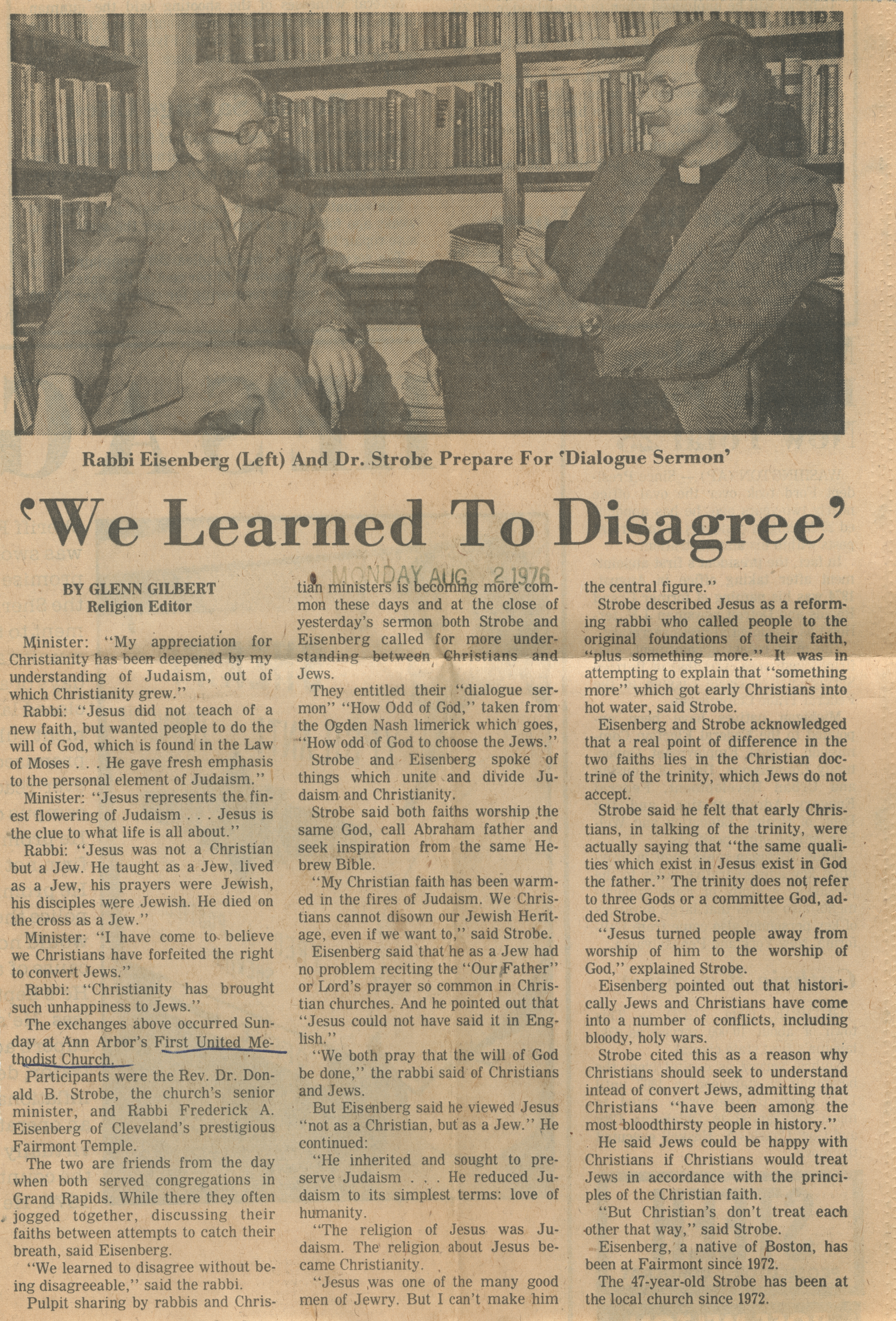'We Learned To Disagree'

'We Learned To Disagree’
BY GLENN GILBERT Religion Editor
Minister: “My appreciation for Christianity has been deepened by my understanding of Judaism, out of which Christianity grew.”
Rabbi: “Jesus did not teach of a new faith, but wanted people to do the will of God, which is found in the Law of Moses ... He gave fresh emphasis to the personal element of Judaism.”
Minister: “Jesus represents the finest flowering of Judaism . . . Jesus is the clue to what life is all about.”
Rabbi: “Jesus was not a Christian but a Jew. He taught as a Jew, lived as a Jew, his prayers were Jewish, his disciples were Jewish. He died on the cross as a Jew.”
Minister: “I have come to believe we Christians have forfeited the right to convert Jews.”
Rabbi: “Christianity has brought such unhappiness to Jews.”
The exchanges above occurred Sunday at Ann Arbor’s First United Methodist Church.
Participants were the Rev. Dr. Donald B. Strobe, the church’s senior minister, and Rabbi Frederick A. Eisenberg of Cleveland’s prestigious Fairmont Temple.
The two are friends from the day when both served congregations in Grand Rapids. While there they often jogged together, discussing their faiths between attempts to catch their breath, said Eisenberg.
“We learned to disagree without being disagreeable,” said the rabbi. Pulpit sharing by rabbis and Christian ministers is becoming more common these days and at the close of yesterday’s sermon both Strobe and Eisenberg called for more understanding between Christians and Jews.
They entitled their “dialogue sermon” “How Odd of God,” taken from the Ogden Nash limerick which goes, “How odd of God to choose the Jews.”
Strobe and Eisenberg spoke of things which unite and divide Judaism and Christianity.
Strobe said both faiths worship the same God, call Abraham father and seek inspiration from the same Hebrew Bible.
“My Christian faith has been warmed in the fires of Judaism. We Christians cannot disown our Jewish Heritage, even if we want to,” said Strobe.
Eisenberg said that he as a Jew had no problem reciting the “Our (Father” or Lord’s prayer so common in Christian churches. And he pointed out that “Jesus could not have said it in English.”
“We both pray that the will of God be done,” the rabbi said of Christians and Jews.
But Eisenberg said he viewed Jesus “not as a Christian, but as a Jew.” He continued:
“He inherited and sought to preserve Judaism ... He reduced Judaism to its simplest terms: love of humanity.
“The religion of Jesus was Judaism. The religion about Jesus became Christianity.
“Jesus was one of the many good men of Jewry. But I can’t make him the central figure.”
Strobe described Jesus as a reforming rabbi who called people to the original foundations of their faith, “plus something more.” It was in attempting to explain that “something more” which got early Christians into hot water, said Strobe.
Eisenberg and Strobe acknowledged that a real point of difference in the two faiths lies in the Christian doctrine of the trinity, which Jews do not accept.
Strobe said he felt that early Christians, in talking of the trinity, were actually saying that “the same qualities which exist in Jesus exist in God the father.” The trinity does not refer to three Gods or a committee God, added Strobe. '“Jesus turned people away from worship of him to the worship of God,” explained Strobe.
Eisenberg pointed out that historically Jews and Christians have come into a number of conflicts, including bloody, holy wars.
Strobe cited this as a reason why Christians should seek to understand instead of convert Jews, admitting that Christians “have been among the most bloodthirsty people in history.” He said Jews could be happy with Christians if Christians would treat Jews in accordance with the principles of the Christian faith.
“But Christian’s don’t treat each other that way,” said Strobe.
Eisenberg, a native of Boston, has been at Fairmont since 1972.
The 47-year-old Strobe has been at the local church since 1972.
Rabbi Eisenberg (Left) And Dr. Strobe Prepare For 'Dialogue Sermon’